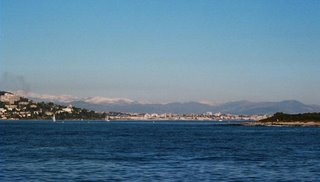Hint: Once more, as with Lilies of the Nile and voting, it’s to do with English mid-nineteenth century sensations.

Carine's news

 Last night, the whole of Kinshasa’s jet-set was on the parking lot of the Grand Hotel waiting for Kinshasa’s event of the year: a concert by the world-famous Jamaican dancehall singer Shaggy with his Congolese mate Werrason, aka “King of the Forest”. The concert was meant to start at 6pm, but I had been warned by my friends that concerts in Congo never start on time. It’s a matter of cachet: no self-respecting star will appear before his or her audience until at least four or five hours after the scheduled time. At the last minute however, a rumour went around that this time the Grand Hotel had insisted that the venue be vacated by 11.30pm, so the concert would start within a reasonable delay. At 7.30pm, F. and I were happily watching the penultimate episode of the first series of Lost (despite repeated warnings that we would be left with no answers and a frustratingly unquenchable desire to know how the bloody story ends), when we were called by a friend who warned us that the place was thriving and the concert about to start. Call it lack of experience, but we rushed over.
Last night, the whole of Kinshasa’s jet-set was on the parking lot of the Grand Hotel waiting for Kinshasa’s event of the year: a concert by the world-famous Jamaican dancehall singer Shaggy with his Congolese mate Werrason, aka “King of the Forest”. The concert was meant to start at 6pm, but I had been warned by my friends that concerts in Congo never start on time. It’s a matter of cachet: no self-respecting star will appear before his or her audience until at least four or five hours after the scheduled time. At the last minute however, a rumour went around that this time the Grand Hotel had insisted that the venue be vacated by 11.30pm, so the concert would start within a reasonable delay. At 7.30pm, F. and I were happily watching the penultimate episode of the first series of Lost (despite repeated warnings that we would be left with no answers and a frustratingly unquenchable desire to know how the bloody story ends), when we were called by a friend who warned us that the place was thriving and the concert about to start. Call it lack of experience, but we rushed over. Waterskiing at dusk on the River Congo
Waterskiing at dusk on the River Congo
A Thought On Death
When life as opening buds is sweet,
And golden hopes the fancy greet,
And Youth prepares his joys to meet,--
Alas! how hard it is to die!
When just is seized some valued prize,
And duties press, and tender ties
Forbid the soul from earth to rise,--
How awful then it is to die!
When, one by one, those ties are torn,
And friend from friend is snatched forlorn,
And man is left alone to mourn,--
Ah then, how easy 'tis to die!
When faith is firm, and conscience clear,
And words of peace the spirit cheer,
And visioned glories half appear,--
'Tis joy, 'tis triumph then to die.
When trembling limbs refuse their weight,
And films, slow gathering, dim the sight,
And clouds obscure the mental light,--
'Tis nature's precious boon to die.
-- Anna Lætitia Barbauld
Rest in peace, Papi. Now you really will grow younger with each passing day, if only in our memories. Already the wheelchair and sluggishness are making way for sailing trips with a little Teckel and an oversized orange life vest, unconventional duet versions of Claude Debussy's Claire de Lune on the piano, long road trips along tortuous mountain roads, and mortifying recordings of Edelweiss in a questionable attempt to give you the von Trapp family. Here's one for you, who loved it best of all:
(Photo taken by Dad)
Thank you for believing in me more than anyone else.

According to my aunt’s sources (an address book containing flower illustrations I believe), this particular African lily blooms in the rainy season, is considered a sacred plant, and was the pinnacle of fashion in mid-nineteenth-century England. Fans can join Friends of Agapanthus (I do wonder what people did with themselves before the Age of Internet).
Speaking of mid-nineteenth-century sensations in England, the count-down has started and the date is set for the first round of the elections: 30 July. This gives the DRC less than two months to print and distribute some 60 million ballot papers – some of which will be as thick as Yellow Pages directories, with a picture and paragraph for every candidate, and up to 700 candidates for a single constituency! – and to deploy election kits across the country – bearing in mind that many places are accessible only by helicopter, bicycle or dugout. Not to mention deploying tens of thousands electoral agents, national and international observers, police officers to provide security on the day, etc, etc. In case you’re wondering where all that tax money that gets spent on the United Nations is going…
Most people who are directly involved in the elections took a two-week holiday between Easter and Labour Day, in the knowledge that the next two months will be Hell. F. and I spent the long week-end in Pointe-Noire again – not quite a two-week holiday, but a very welcome break nonetheless. And another opportunity for a seafood orgy on the beach – this time I took pictures to prove it:
 .
.
.
.
.
.
.
.